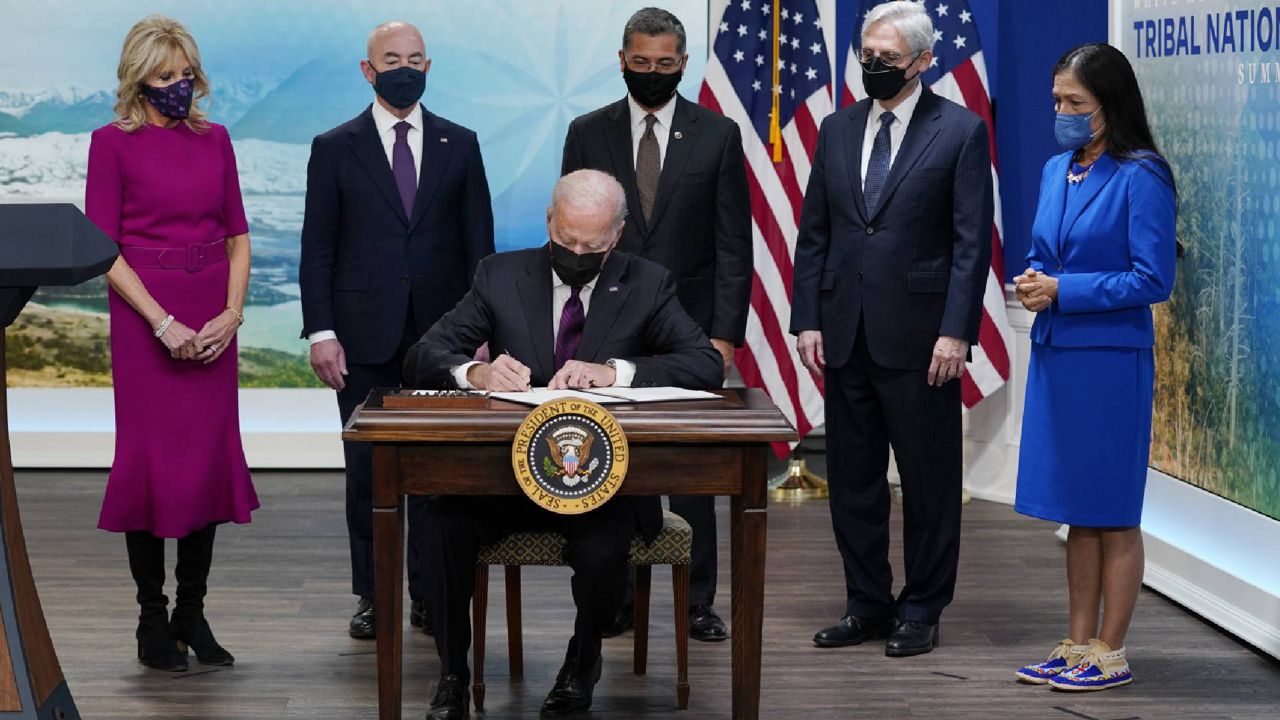President Joe Biden signed an executive order to help improve public safety and justice for Native Americans during the first tribal nations summit since 2016, calling the public works bill he would sign later Monday the "single largest investment of tribal infrastructure ever."
What You Need To Know
- President Joe Biden signed an executive order to help improve public safety and justice for Native Americans during the first tribal nations summit since 2016
- Leaders from more than 570 tribes in the United States were expected join the two-day virtual event beginning Monday, with nearly three dozen addressing the gathering; Biden and first lady Jill Biden spoke at the start on Monday
- The summit is being held virtually because of the coronavirus pandemic, which has affected Native Americans and Alaska Natives at disproportionate rates
- The event is being hosted by the White House for the first time; previous summits were at the Interior Department
Leaders from more than 570 tribes in the United States were expected to join the two-day event beginning Monday, with nearly three dozen addressing the gathering. The summit is being held virtually due to the COVID-19 pandemic, which has affected Native Americans and Alaska Natives at disproportionate rates.
"Our voices have been given a new platform,” said Interior Secretary Deb Haaland, a member of the Pueblo of Laguna tribe, to open the summit on behalf of the Biden administration. "This administration understands that tribal leaders know your communities best and that the right solutions are created when tribes consistently have a seat at the table."
Biden and first lady Jill Biden first spoke on Monday, with Vice President Kamala Harris to follow on Tuesday. Several members of Biden's Cabinet will also participate.
The president called Monday a "big day" for tribal nations and the country, pointing to the $13 billion in the bipartisan infrastructure bill he would sign later in the day dedicated to tribal lands, for high speed internet expansion, clean water improvements, environmental cleanup and more.
"Tribal lands have been chronically underfunded for generations," Biden said before signing the public safety order during the summit.
First Lady Jill Biden, a lifelong educator, spoke about the importance of preserving Native languages, and she was presented with a video of children and young people from tribes around the country speaking in their indigenous language.
She called language a "thread weaving through the past, present and future, the inheritance of our ancestors and a gift we give to our children."
"The ability to speak our own truth, in our own words, is power," she said.
Earlier this year, Jill Biden spent two days in April visiting the Navajo Nation's capital in Window Rock, Arizona.
White House press secretary Jen Psaki said the summit coincides with National Native American Heritage Month and is being hosted by the White House for the first time. The summit was not held during the Trump administration, and past conferences took place at the Interior Department.
American Indians and Alaska Natives are more than twice as likely to be victims of a violent crime and at least two times more likely to be raped or sexually assaulted compared to other races, according to the Association on American Indian Affairs.
Biden's order will mandate the Justice, Homeland Security and Interior departments work together to help combat human trafficking and crime on native lands, officials said. They are looking at ways to strengthen participation in Amber Alert programs and national training programs for federal agents. They will also create the position of a liaison who can speak with family members and to advocates.
The administration is also announcing steps to protect Chaco Canyon, a national park and UNESCO World Heritage site a few hours northwest of Albuquerque, New Mexico.
The Bureau of Land Management will begin a study on the possible withdrawal from federal lands within a 10-mile (16-kilometer) radius of Chaco Culture National Historical Park, which would bar new federal oil and gas leasing on those lands. Those lands will not be eligible for leasing while the study is underway, though past administrations had already opted to impose the buffer administratively.
The complaint by environmentalists and some tribes has been that the move is only temporary and that permanent protections are needed. But it isn't so simple; while some tribes have fought for protections, the Navajo Nation, which has more to lose by curbing oil and gas, have asked for a smaller radius around the site.
Since taking office in January, Biden has taken steps several steps that the White House says demonstrate his commitment to tribal nations.
Among them are naming Deb Haaland, a former congresswoman from New Mexico, as the first Native American to lead the Interior Department, the powerful federal agency that has wielded influence over U.S. tribes for generations. Haaland is a member of the Laguna Pueblo.
Biden's coronavirus relief plan included $31 billion for tribal communities, and the administration also has worked closely with tribal leaders to help make COVID-19 vaccination rates among Native Americans among the highest in the country, the White House said.
Navajo Nation Council Delegate Amber Kanazbah Crotty said she was hoping the summit would help eliminate red tape when building critical infrastructure on tribal lands. And she was "looking for concrete action by the administration to issue executive orders to provide as much support to Native Nations to recover from COVID-19 and the systemic under service of our communities."
Biden also recently became the first president to issue a proclamation designating Oct. 11 as Indigenous Peoples' Day, giving a boost to longstanding efforts to refocus the federal holiday celebrating Christopher Columbus toward an appreciation of Native peoples.



